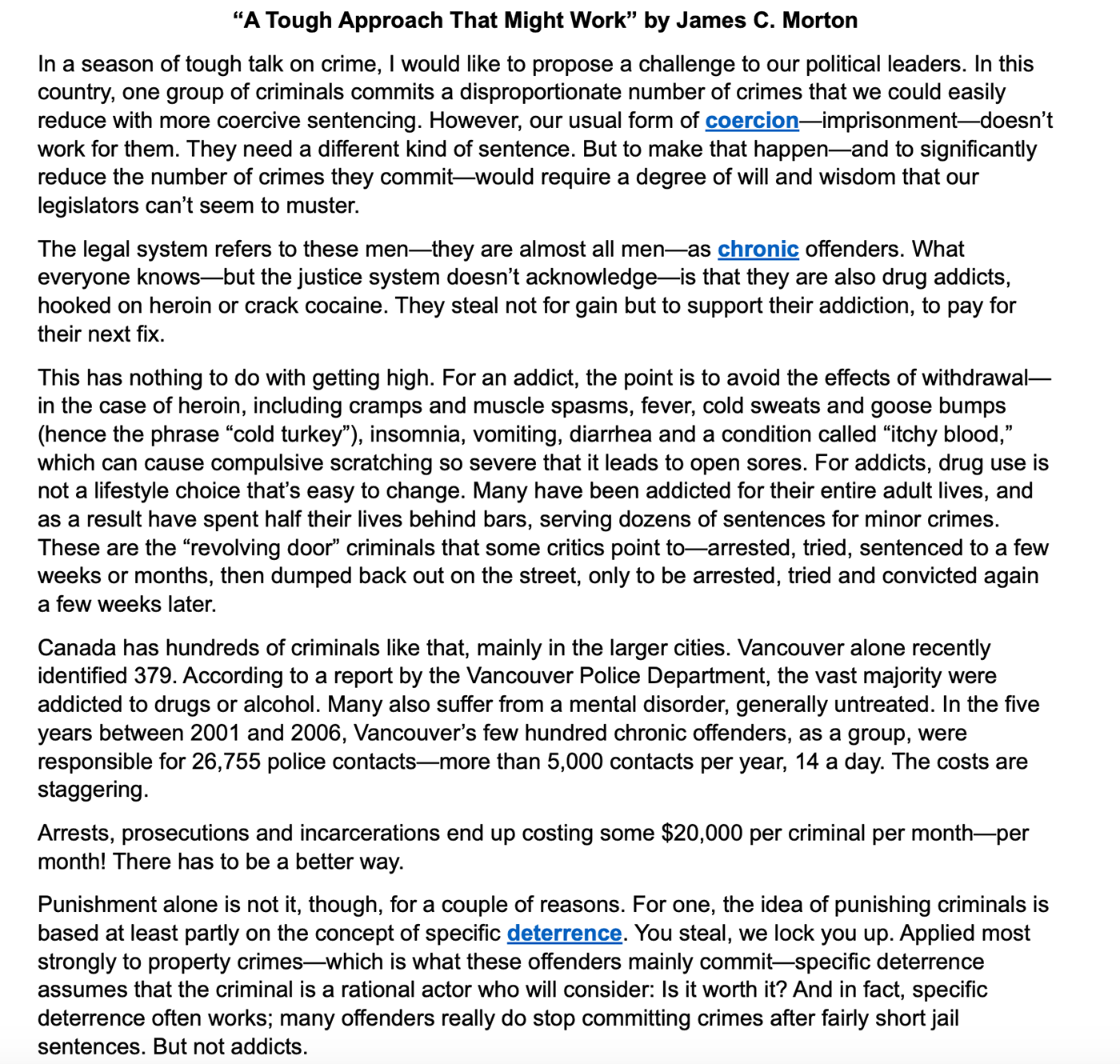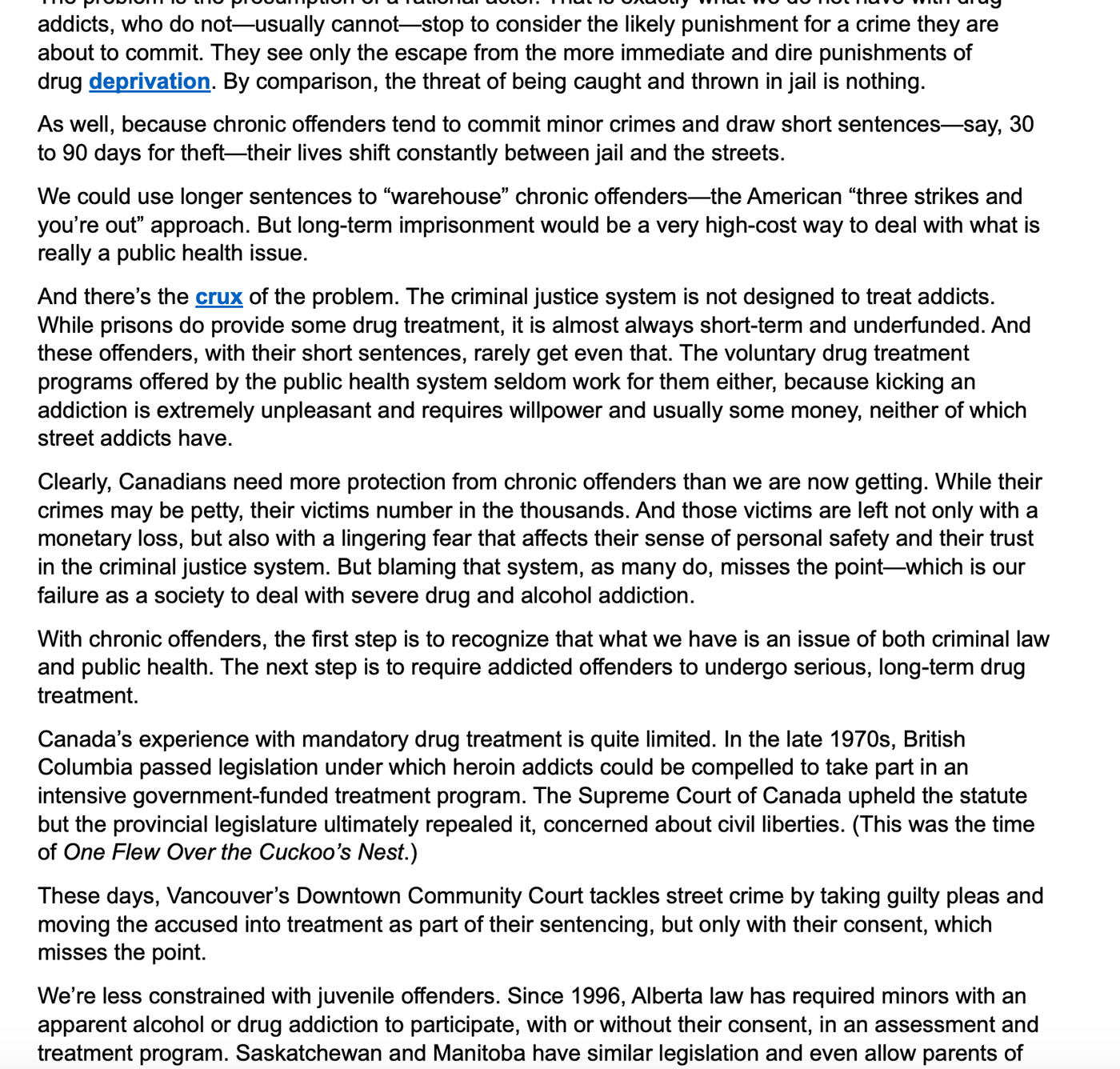The goal to answer an important question;
If it is true that most thefts are committed by drug addicts who are avoiding withdrawal, why do you think society is so slow to deal with the problem? Write an OUTLINE for a preliminary essay outlining your reasons.
Firstly, we can all agree that the evolution of our society cannot be stopped because change is inevitable. However, we seem to have the same problems that past generations had and addicts aren’t the exception. Addicts are struggling with the same things they struggled with 50 years ago and will be struggling for 50 more years if there’s no change. Together with their crimes are to satisfy a need and avoid withdrawal. Since as humans we have a selfish nature concerning every part of our life, we aren’t better than these criminals, we just found a healthy way to satisfy our needs.
So, I believe that as a society we should make those changes by electing people that can make a difference. I see it as the first step because right now not enough people know about this problem these people are facing. Most of us are ignorant of this particular subject. That being said, society is slow to deal with the problem because we aren’t demanding any change or any help.
Like James C. Morton said at the end of his article that as a society we don’t “elect our leaders to solve such problems.”
Moreover, once the government hears our demands the next step would be elaborating a new strategy to work together; both criminal law and public health. Due to the fact these offenders are addicts, it is only logical to have them work together. I see the legal system as a just system. When someone murders due to a mental illness that they have, they are sent to a psychiatric hospital. Why wouldn’t it be the same for chronic offenders? It doesn’t excuse their crime, but they have the help they need in a proper institution that can help them.
Corresponding with what Morton said, “both the justice system and the health system have entrenched groups with turf to protect: prisons, parole boards, hospitals.”
Secondly, we can all agree that being an addict is an illness, and we cannot always hold the person accountable for their actions when facing their mistakes. If as a society we can’t see that these criminals have different needs than the other prisoners, we can’t expect them not to have any type of drug withdrawal.
This being said, I strongly believe that as a society we should look at the problem and try to figure out ways to solve it. Instead, we run away from and we look the other way. In this case, the problem is the injustice of the incompetence of the legal system for chronic offenders. Now, don’t get me wrong, I am not defending or even excusing their crimes due to their illness, I am saying that they shouldn’t be treated like any other criminal. These are sick people, struggling with addiction, the legal system should acknowledge that.
If we take for example everything that James C. Morton has said that crimes committed by chronic offenders should not be dismissed as a property crime. Since their actions cannot be considered as ration due to the fact that they don’t consider if it’s worth it. Addicts don’t stop committing crimes after their short sentences because they are not aware of the gravity of their actions.
Furthermore, investing in a proper rehabilitation center inside prisons could help guide these offenders and get them the help they need. Since for most of them, prison isn’t a real punishment because they’re too desperate to appease their needs for drugs. This is a real problem, and many things have to change; having the proper tools, changing proceedings for chronic offenders, investing more time in them. We cannot expect them to get better and solve all of their issues in a couple of weeks. Time is such an important aspect in the recovery of an addict, and as long as we don't acknowledge this we cannot move forward. As in the present moment, nothing is changing because we need to take into consideration all of these things.
For example, like James C. Morton said, “while prisons do provide some drug treatment, it is almost always short-term and underfunded.”
Thirdly, I think that chronic offenders don’t like the effects of withdrawals because it causes so many side effects like vomiting, scratching and so much more. They want to avoid them at all costs even by doing illegal things like thefts. They don’t see a way out and can’t change their lifestyle. Their addictions aren't letting them see the consequences. Again, they are ill and don’t have the proper guidance.
So much that I can say that the system is failing them. Their crimes are small and their sentences are short. There is no time to help them with their addiction. So, they are constantly in and out of prisons.
Their only options are to steal or commit small crimes to satisfy their addiction. Morton clearly stated that they are the “revolving door” criminals. Without any type of help or any type of changes, I’ve stated in this essay they are lost forever. This is why society is slow when it comes to this problem. We stand here like nothing is happening.
Another reason why society isn’t moving at a fast pace with chronic offenders is due to the lack of funding in prisons. Sadly, without money resources are cut, and anyone cannot do anything without money. Let’s face it, prison is a harmful place to be, but it is also an expensive place to be. When you think about it, prison is a good option for someone in the streets because in prison he has everything that his freedom is lacking; food, shelter, and heating.
Indeed, as Morton observed, ”arrests, prosecutions, and incarcerations end up costing some $20,000 per criminal per month.” So, looking at the budget there isn’t going to be enough money or motivation to invest in rehabilitation programs within every prison.
To conclude, thefts are committed by drug addicts who are avoiding withdrawals because they cannot deal with their illness alone. To be honest, I don’t think they even want to deal with it. They say you cannot help someone that doesn't want to be helped, but I think whoever said that is wrong. With everything I’ve started today, I believe that as a society we have to change in order to help these criminals. Bottom line, it is slow to deal with the problem because of our ignorance, the incorrect legal proceeding, and the unchangeable side effects a drug addict has without drugs.
To add a little context a lawyer, legal educator, and author of “A Tough Approach That Might Work”, James C. Morton argues that tough punishment is not the solution to the common problem of chronic offences in the area of petty theft. He is past president of the Ontario Bar Association and a
long-time human rights and community activist. He’s served as a governor for the Canadian International Peace Project, counsel for the Canadian Somali Congress, and legal counsel (pro bono) for Artists Against Racism, a registered charity fighting racial and religious prejudice.
Article down bellow



